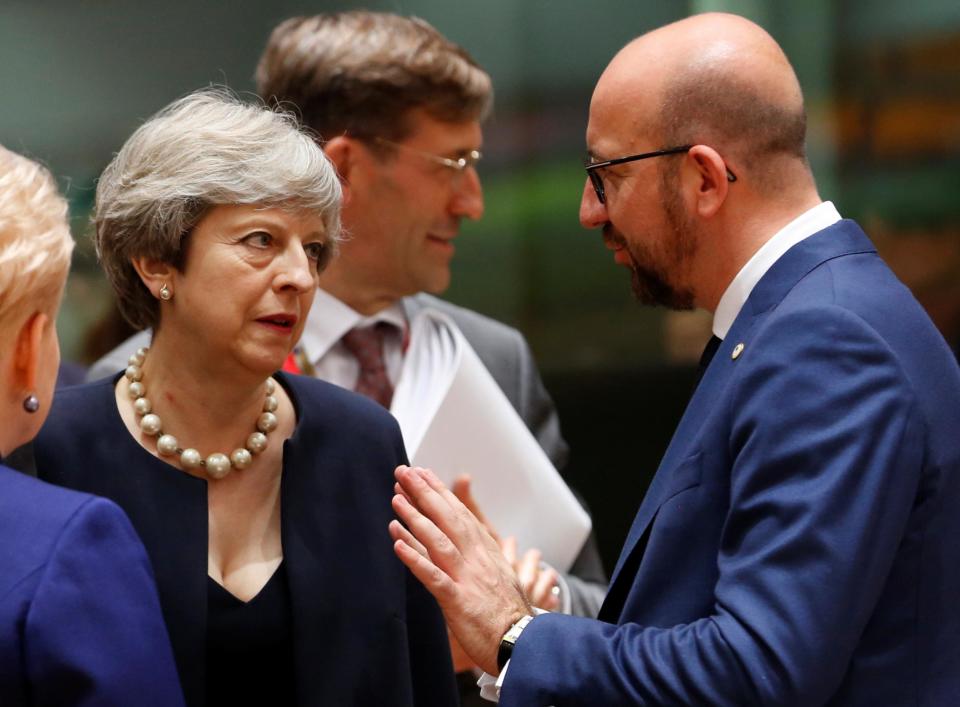After Salzburg, Theresa May will say she's ending free movement of people – and then she'll do the opposite
When Theresa May discusses a Brexit deal with the 27 EU leaders over dinner in Salzburg tonight, she will demand that they match the “flexibility” she has shown and drop their “unacceptable demands”.
The good news for the prime minister is that the other EU leaders will not kill her Chequers blueprint when they decide their next moves without her round the table tomorrow. They will never accept May’s proposals on customs and a single market for goods, but are prepared to help her overcome her domestic political woes because, like her, they would much prefer a deal to a disruptive no-deal departure next March.
But despite Michel Barnier’s warmer words on the biggest stumbling block – the Irish border – the two sides still remain “poles apart” on the issue, as one Whitehall source put it.
What May should do tonight is to offer a generous future regime for EU migration. That would unblock the negotiations because it would provide substance rather than more spin, and significantly boost her chances of securing an EU commitment to a long-term trade deal that she could claim was based on Chequers. May could argue she has “ended free movement”, in line with the “will of the people” in the 2016 referendum.
However, the signs are that May is heading in the opposite direction. Ominously, she intends to announce her long-overdue immigration policy to the Conservative Party conference in two weeks. She wants a “level playing field” between the EU and rest of the world. So does Sajid Javid, the home secretary, who has torn up his predecessor Amber Rudd’s plans to retain preferential access for EU migrants. May should resist the temptation to play to the Tory gallery and pander to the worst instincts of her audience, as she did with her ill-judged attack on “citizens of nowhere” at the same conference and same Birmingham venue two years ago.
When the cabinet discusses immigration next Monday, she should listen to ministers such as Philip Hammond, the chancellor, and Greg Clark, the business secretary, who want to use migration as a bargaining chip in the Brexit talks. They are rightly worried that requiring EU workers in Britain to obtain a visa after six months would provoke retaliatory measures by the EU27, creating another burden for business, already deeply worried by the uncertainty of Brexit.
Countries such as India will make preferential access for their people their top demand in return for a trade deal with the UK. So it is logical to keep a liberal regime for the EU, in the hope of safeguarding trading links with the UK’s biggest partner. EU migrants contribute £4.7bn a year more in taxes than they receive in benefits and public services – more than those from the rest of the world, who take out £9bn more than they put in.
The figures emerged in Tuesday’s report by the Migration Advisory Committee, which will give May some cover for her approach. The group is independent but seems to have bent over backwards to help Downing Street by proposing an end to preferential EU access and declining to express a view on whether migration should form part of the Brexit negotiations. It’s blindingly obvious that it will. The committee’s proposals to lift the 20,700-a-year cap on skilled migration is welcome, but its plans to end low-skilled EU migration, with the exception of agricultural workers, are worrying. The IPPR think tank calculates that about three quarters of EU full-time workers now in the UK would not get a work visa under such a system, including 97 per cent of those in hotels and restaurants. Although existing workers would probably be protected under a withdrawal agreement, the plan would cause huge problems for employers in future.
The committee also missed an opportunity to knock the final nail in the coffin of the UK’s discredited target to reduce net migration below 100,000. Professor Alan Manning, its chairman, said it made no recommendation on the target because it was “a political statement” and “not in itself an immigration policy”.
As The Independent’s Drop the Target campaign has highlighted, the goal is way past its sell-by date. Turning the vacuous slogan “global Britain” into reality will require an open Britain in order to land trade deals.
Even Javid cannot bring himself to defend the target. The truth is that it is no longer the government’s goal but that of one person – May, who clings to it stubbornly in the hope it will convince voters she is “tough” on immigration. Her target will depart with her, probably next year.

 Yahoo News
Yahoo News 

